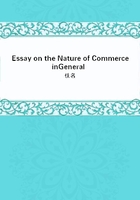
第24章
Of Metals and Money, and especially of gold and silver As land produces more or less corn according to its fertility and the labour spent upon it, so the mines of iron, lead, tin, gold, silver, etc. produce more or less of these metals according to the richness of the mines and the quantity and quality of the labour spent upon them, in digging, draining, smelting, refining, etc. Work in silver mines is dear on account of the mortality in causes, since rarely more than five or six years are spent in that labour.
The real or intrinsic value of metals is like everything else proportionable to the land and labour that enters into their production. The outlay on the land for this production is considerable only so far as the owner of the mine can obtain a profit from the work of the miners when the veins are unusually rich. The land needed for the subsistence of the miners and workers, that is the mining labour, is often the principal expense and the ruin of the proprietor.
The market value of metals, as of other merchandise or produce, is sometimes above, sometimes below, the intrinsic value, and varies with their plenty or scarcity according to the demand.
If the proprietors of land and the lower orders in a state who imitate them, rejected the use of time and copper, wrongly supposing that they are injurious to health, and if they all made use of dishes and utensils of earthenware, these metals would be at a very low price in the markets and the work that was carried on to extract them from the mine would be discontinued. But as these metals are found useful, and are employed in the service of life, they will always have a market value corresponding to their plenty or rarity and the demand for them; and they will always be mined to replace what is lost by daily use.
Iron is not merely serviceable for the daily use of common life but may be said to be in a certain sense necessarily; and if the Americans, who did not make use of it before the discovery of their continent, had found mines of it and known how to use it, they would doubtless have laboured to produce it at any cost.
Gold and silver are capable of serving not only the same purpose as tin and copper but most of the purposes of lead and iron. They have this further advantage over other metals that they are not consumed by fire and are so durable that they may be esteemed permanent bodies. It is not surprising, therefore, that men who found the other metals useful should have esteemed gold and silver even before they are used in exchange. The Romans prized them from the foundation of Rome and yet only used them as money 500 years later. Perhaps all other nations did the like and only adopted these metals as money long after using them for other purposes. However we find from the oldest historians that from time immemorial gold and silver were used as money in Egypt and Asia, and we learn in the Book of Genesis that silver monies were made in the time of Abraham.
Let us suppose that silver was first found in a mine of Mount Niphates in Mesopotamia. It is natural to think that one or more proprietors of land, finding this metal beautiful and useful, were the first to use it, and willingly encouraged the miner or undertaker to extract more of it from the mine, giving him in return for his work and that of his assistants so much of the produce of the land as they needed for their maintenance.
This metal becoming more and more esteemed in Mesopotamia, if the large landowners bought ewers of silver, the lower classes, according to their means or savings, might buy silver cups; and the undertaker of the mine, seeing a constant demand for his merchandise, gave it without doubt a value proportionable to it quality or weight against the other products or merchandise which he took in exchange. While everybody looked on this metal as a precious and durable object and strove to own a few pieces of it, the undertaker, who alone could supply it, was in a manner master to demand in exchange an arbitrary quantity of other produce and merchandise.
Suppose now that on the further side of the River Tigris, and therefore outside Mesopotamia, a new silver mine is discovered, of which the veins are incomparably richer and larger than those of Mount Niphates, and that the working of this new Mine which was easily drained was less laborious than that of the first.
The undertaker of this new mine was naturally in a position to supply silver much cheaper than the undertaker of Mount Niphates, and the people of Mesopotamia who wished to have pieces and objects of silver would find it more advantageous to export their merchandise and give it to the undertaker of the new mine in exchange for silver than to take it from the original undertaker. This last, finding a smaller demand, would of necessity reduce his price; but the new undertaker lowering his price in proportion the first adventurer would be obliged to stop his output, and then the price of silver in exchange for other merchandise and produce would be necessarily fixed by that which was put upon it at the new mine. Silver then cost less to the people beyond Tigris than to those of Mesopotamia who had to bear the cost of a long carriage of their merchandise and produce to obtain silver.